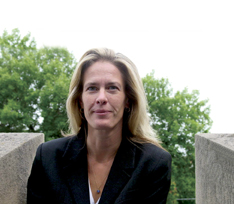 New
leadership for University Theater
New
leadership for University Theater
Heidi
Coleman brings new ideas to the U of C's largest student organization.
When
longtime University Theater Director Curt Columbus announced
last year he was leaving to join the artistic staff of Steppenwolf
Theatre, the UT student committee and administrators looked
carefully for the right candidate to fill his shoes.
 Enter
Heidi Coleman, who now oversees the campus's largest student
organization, with more than 400 students from all disciplines
participating in UT each year. A self-described "hybrid,"
Coleman brings experience in academics and performance. With
a bachelor's degree in theater from Duke University and a master's
from Columbia University, she has worked as a director, stage
manager, and dramaturg and taught at Columbia University, Barnard
College, and TheaterWorks in California.
Enter
Heidi Coleman, who now oversees the campus's largest student
organization, with more than 400 students from all disciplines
participating in UT each year. A self-described "hybrid,"
Coleman brings experience in academics and performance. With
a bachelor's degree in theater from Duke University and a master's
from Columbia University, she has worked as a director, stage
manager, and dramaturg and taught at Columbia University, Barnard
College, and TheaterWorks in California.
Coleman
was drawn to UT because students run the program. "They
have both autonomy and ownership," she says. Since students
involved in UT make all artistic and production decisions, they
"are faced with the same questions and concerns" facing
any professional theater.
"What
is exceptional about UT students is that they are fluent in
all aspects of theater-able to act, direct, design, and produce,"
she says. "Students master essential skills of problem
solving, conflict resolution, communication, and leadership.
This experience will fundamentally serve them in whatever career
they choose."
Coleman
brings several new ideas to UT. This fall, for example, she
launched the Friday afternoon Lab Series, a workshop and discussion
series that brings together students, faculty, and guest artists,
including members of Steppenwolf Theatre and Court Theatre.
She
is also revamping the School Partnership Program (SPP), which
hires UT students to teach drama in neighborhood schools. SPP
teachers will now start with intensive three-day training with
guest artists and educators, and then once a month the Friday
Lab Series will bring a guest artist or educator to continue
SPP teacher training. "Ultimately," Coleman says,
"I hope this will lead to a new course being developed
in time for SPP next fall."
In
response to student demand, Coleman is also expanding course
offerings to include stage combat, active dramaturgy, ensemble
analysis, and Meisner method acting. Meanwhile, UT is expanding
physically. Scenery construction has moved out of the Reynolds
Club, allowing for much-needed design space, and two classroom/rehearsal
spaces will open in the new Bartlett Dining Commons this winter.
In
addition to teaching an introductory drama course this fall,
Coleman advises a group of ten students on an independent-study
course, The Antigone Project. Conceived by Saket Soni, AB'01,
the student-created dramatic production is based on the real-life
stories of asylum seekers assisted by the Kovler Center, a human-rights
group.
In
the near future Coleman hopes to hold UT-sponsored conferences
on the arts in education and on the growth of performance-studies
departments.
-Carrie
Golus, AB'91, AM'93

![]()
 New
leadership for University Theater
New
leadership for University Theater Enter
Heidi Coleman, who now oversees the campus's largest student
organization, with more than 400 students from all disciplines
participating in UT each year. A self-described "hybrid,"
Coleman brings experience in academics and performance. With
a bachelor's degree in theater from Duke University and a master's
from Columbia University, she has worked as a director, stage
manager, and dramaturg and taught at Columbia University, Barnard
College, and TheaterWorks in California.
Enter
Heidi Coleman, who now oversees the campus's largest student
organization, with more than 400 students from all disciplines
participating in UT each year. A self-described "hybrid,"
Coleman brings experience in academics and performance. With
a bachelor's degree in theater from Duke University and a master's
from Columbia University, she has worked as a director, stage
manager, and dramaturg and taught at Columbia University, Barnard
College, and TheaterWorks in California.